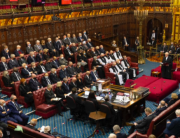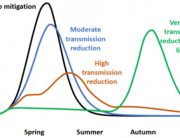Susanne Burri explores some of the moral complexities of the WWII bombings.
In June 1944, the Germans started terror bombing London with revolutionary technology: their “V-weapons” were the world’s first guided missiles. When the terror bombing of London started, the V-weapons’ guidance system was not yet very accurate, so the German engineers needed to know where their missiles were falling in order to fine-tune their weaponry. Since the British press was censored, and because reconnaissance flights over London were not feasible, the Germans turned to their London-based spies and asked them to report the timing and location of bomb impacts as quickly and accurately as possible.
As it happened, many London-based German spies had been turned into British double agents by mid-1944. These double agents enquired with their British contacts as to what information they should pass on to the Wehrmacht.
The British thought it likely that the enemy had made Charing Cross – a busy railway station in Central London – the “mean point of impact” (MPI) of their bombs, thus maximizing the expected negative impact on infrastructure, civilian lives, and British morale. The British soon realized, however, that the V-weapons were on average falling short of their presumed target. While individual bombs fell scattered all over London, and around south-east England at large, it soon became evident that south-east London was being hit the worst. About ten days after the bombings had started, the V-weapons’ actual MPI lay in Dulwich, some four miles south-east of Charing Cross (Jones, 1978, p. 420).
In this situation, Sir Samuel Findlater Stewart, chairman of the Home Defence Executive (a committee set up in 1940 to organise the defence of Britain against enemy forces), came up with an ingenious proposal. His suggestion was to have the double agents selectively report actual bomb incidents so as to create the impression that the enemy were currently overshooting their target. This should lead them to shorten their range, thus causing them to undershoot even further. In this way, it should have been possible to redirect the current MPI about six miles further to the south-east. Compared to the option of leading the enemy to believe that they were currently on target, it was estimated that this would lead to 1,600 fewer bomb-related civilian deaths for each month that the bombings continued; compared to providing the enemy with an accurate picture of the situation, it was estimated it would lead to 2,200 fewer deaths (CAB 113/35, 2 August 1944).
But Findlater Stewart’s “redirection strategy” didn’t only promise to effectively protect lives and infrastructure. By allowing the British double agents to report back seemingly useful and, in principle, verifiable information, it also promised to keep intact the double agents’ reputation as excellent German spies, a reputation that many of them had carefully built over many months. This reputation was strategically valuable, as it provided the British with a tried and tested channel of influence over the Germans.
While the Armed Forces Chiefs of Staff were all in favour of implementing Stewart’s proposal, the War Cabinet’s Ministers turned it down. Officially, they argued that “it was not for the Government to authorise action which would result in certain areas in South London getting a heavier discharge of flying bombs and sustaining heavier casualties than they do at the present time” (PREM 3/111A, 3 August 1944). The ministers felt that “if it came out that the Government had authorised such action their position would be indefensible” (ibid.).

Heinkel over Wapping. Public Domain.
Can we make sense of the ministers’ aversion to the redirection strategy from the perspective of moral philosophy? In light of the fact that the ministers doubted neither its prudence nor its effectiveness, it is quite puzzling that they should have resisted its implementation. Morally speaking, is there anything that weighed against the redirection of the German bombs?
It could be that there is a moral principle that says that you ought never to interfere with someone’s evil plan if you thereby risk grave harm befalling non-consenting, innocent people who would not otherwise have been harmed. But once we stop to think about it, this moral principle is not very plausible. If it were correct, no defensive war against any evil attacker would ever be morally justified.
This principle, or one very much like it, would not seem to be what moved the ministers to resist the redirection strategy either. When the War Cabinet rejected the proposal to redirect the German bombs, they didn’t instruct the double agents to remain silent throughout the bombings. Instead they “invited the deception authorities to arrange that the information conveyed to the enemy […] was such as would create confusion in his mind and present him with an inaccurate picture” (CAB 121/214, 28 July 1944). It is clear that implementing the War Cabinet’s “confusion strategy” would have risked grave harm to at least some civilians who might not otherwise have been harmed – just as implementing the redirection strategy would have.
A more promising explanation of the ministers’ aversion to redirection can be found once we turn our attention to considerations of equality. A government owes its duty of protection equally to all of its civilians. It cannot just kill some of its civilians to protect more numerous others, even if doing so would clearly minimize the expected number of civilian deaths. In the case at hand, the British government would not have killed any of its citizens by implementing the redirection strategy. But it would still have shown an – admittedly less dramatic – unequal concern for the safety of different parts of its population: to redirect the bombs would have meant knowingly burdening one part of the population with the brunt of the German attack, thereby reducing the threat to everyone else. To bring the problem closer to our situation in 2016, implementing the redirection strategy would have been structurally similar to deciding on a rescue operation of a travel group who have fallen into terrorist hands, with the instruction to leave the weaker members of the group behind, so as to maximize the number of people who can be expected to be brought back to safety.
If it is considerations of equality that made the ministers resist Findlater Stewart’s proposal, then I believe that they were right to feel the force of these considerations. But, for two reasons, I also believe that they gave these considerations too much weight. First, redirection promised to be far more effective at protecting civilian lives than the ministers’ proposed confusion strategy. This already tilts the balance in favour of redirection. Second, confusing the enemy was not actually a good way of protecting all civilians equally. In the terrorist analogy, the obvious way of showing an equal concern for the safety of all members of the travel group is to free them all, even if this reduces the chance of getting the group back to safety. But in our case, confusing the enemy would not have been a way of trying to protect everyone equally – implementing it would merely have made it difficult to predict which part of the population would subsequently be worst affected by the German attack. In sum, considerations of effectiveness spoke clearly in favour of redirection, while considerations of equality did not speak clearly in favour of confusion. It therefore seems that all things considered, redirection would have been the morally more attractive option of the two.
Susanne Burri is an Assistant Professor in the Department of Philosophy, Logic, and the Scientific Method at LSE. Her research interests include normative ethics and the philosophy of economics.
Bibliography
Featured image: Public Domain






























































































































I found this analysis very interesting. I wanted to add that (and I think on the logic of the article’s final claim this may fit) given the maxims analysed didn’t generate the most morally attractive option, there might be a further operative difficulty for the ministers, that of the notion hinted at in the article, of political accountability to the populus, and that accountability meaning the particular member(s) of the executive couldn’t politically survive being called to account for this particular decision. By leaving the ‘where’ to bomb, in the hands of the enemy, they’d not be accountable for deaths in a given district. By taking responsibility for the ‘where’ being a particular (rather than a non-specific) location, the residents of that particular district would feel justified in calling for the resignation of those members of the executive, and requiring their representative to call for it. In turn by exposing itself to grave political danger, the executive would have harmed its future ability to prosecute a defensive war.
Political accountability generates some peculiar ethical issues. I think this example shows constitutionally a difficulty of having the prerogative self-defence function being necessarily subject to the ordinary norms of political accountability. The problem is that the demos is capable of deciding that the state should not be defended (as was by delegation the case here). If the executive obeys that command, it hasn’t fulfilled its duty prior to all others, to protect the citizens at all costs. However here if it instead fulfils this duty to protect, it would be subject to the sanctions of political accountability from the people it sacrificed. So in the above case it escaped the possibility of accountability for a decision to sacrifice a specific area, by allowing more deaths overall. The hypothetical demos got its way – a larger group of the citizens were not defended, because of the imputed desire of the demos that none of them be sacrificed.
This is a highly enjoyable analysis, however there is a utilitarian aspect to this case which may be worth considering. As you say, shifting the MPI several miles to the south east of Dulwich will have resulted in different casualties, but it would also have resulted in different material damage. Charing Cross was a major transport hub and very close to several key command and control nodes such as Whitehall, the Admiralty, the PM’s bunker – clearly that’s why the Germans nominated it as the aiming point. Leaving the RAF airfields of Fighter Command aside, the low density suburbs of South East London were not nearly so crucial to the war effort. So whilst the Ministry were faced with a choice between two regrettable outcomes, by shifting the fall of bombs away from Central London it could be assumed that they could influence the outcome of the war in our favour. As the precedent had been set in 1940/1 when the RAF developed the ability to ‘bend’ Luftwaffe navigation signals away from specific targets such as the Rolls Royce aero engine factory and have the bombs fall into neighbouring areas – the so called ‘Battle of the Beams’ – I am surprised to learn that they chose not do it in this case.
Thank you for your comment! It’s a very important consideration that shifting the MPI further southeast would have protected crucial infrastructure. In the long run, protecting crucial infrastructure might well have saved more British lives than directing the V-weapons from more towards less densely populated areas.